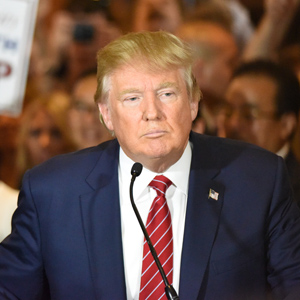Is Donald Trump about to violate the emoluments clause?

President-elect Donald Trump. Photo by a katz / Shutterstock.com.
The U.S. Supreme Court has never directly considered the emoluments clause, which is intended to bar U.S. office holders from accepting gifts from foreign sovereigns.
Indeed, courts may be powerless to address violations because no one would have standing to sue.
But the clause is in the limelight as a result of Donald Trump’s widespread business operations, report the New York Times, ThinkProgress, a Volokh Conspiracy post by Case Western Reserve law professor Erik Jensen, and a New York Times op-ed by Fordham law professor Zephyr Teachout.
Trump’s companies do business with entities controlled by foreign governments and people who have ties to foreign governments, the Times explains. That could violate the emoluments clause.
The clause states that, absent congressional consent, no one holding any office of profit or trust shall “accept of any present, emolument, office or title, of any kind whatever, from any king, prince or foreign state.”
“If nothing else,” Jensen writes at the Volokh Conspiracy, “the clause emphasizes the founders’ fears about economic benefits coming to American officials from foreign governments. It adds a constitutional dimension to some good, old-fashioned appearance-of-impropriety concerns.”
According to former White House ethics lawyer Norman Eisen, every dollar Trump receives from a foreign government in excess of a fair market price for what is received would violate the emoluments clause, to the extent the payment is not part of an arm’s-length transaction.
Jensen says many of the issues are unsettled, such as whether foreign-created corporations should be treated as foreign sovereigns under the clause, and whether arm’s-length transactions are exempted.
Some legal scholars believe the emoluments clause doesn’t apply to the president. They include Seth Barrett Tillman, according to the Times and LawNewz. He notes a different clause of the Constitution making bribery an impeachable offense specifically mentions the president, while the emoluments clause does not. He argues the lack of a mention is one indication the emoluments clause doesn’t apply to the president.
Another indication, he says, is historical precedent. George Washington took gifts from French government officials when he was president. “If he didn’t follow the emoluments clause, there is no reason to think President Trump has to either,” Tillman told LawNewz.
Another issue is standing. “It is difficult to conceive of a scenario in which someone would have standing to challenge Trump’s arrangements, and even harder to think what sort of remedy could be ordered by a court,” Case Western Reserve law professor Jonathan Adler writes at the Volokh Conspiracy.
“In other words,” Adler writes, “if there are concerns about how President Trump handles his various investments, the only remedies will be political.”
The emoluments clause issue has also arisen when President Obama received the Nobel Prize, and with regard to contributions made by foreign governments to the Clinton Foundation when Hillary Clinton was secretary of state. The Justice Department evaluated the Nobel Prize issue and concluded the $1.4 million prize did not come from the Norwegian government, and Obama could accept the money.
Updated at 12:45 p.m. to include LawNewz story.
Write a letter to the editor, share a story tip or update, or report an error.


